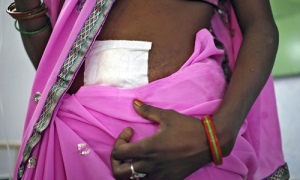News media focused in November on deaths in India after women had surgery at a sterilization “campâ€. Authorities suspect that the surgeon caused more than a dozen deaths, so he is in prison.
More people are added to the population of India each year than to any other country. India has family planning programs, but abuses occur. This epidemic of deaths may have occurred because of disregard for established standards.
Indian gynecologist Pravin Mehta holds the world’s record for the number of tubal ligations that one doctor has done—over a quarter million. He told me how he could do 300 surgeries in one day; Henry Ford would have been amazed!
I didn’t realize how crude Mehta’s process was until I saw a movie of him working in a surgery camp. Operations were performed in a tent, and conditions were very primitive.
Nevertheless, Dr. Mehta’s safety record was remarkable. He offered a reward for anyone who reported a problem, including pregnancy, after his surgery, but gave out very few rewards. Indeed, I believe that his complication rate was lower than surgeons doing tubal ligations under modern conditions.
Were all these surgeries truly voluntary? During the era when Dr. Mehta worked—1970s and 1980s—India had aggressive sterilization programs for both men and women. Acceptors were given a small stipend if they agreed to the surgery. Recently the stipend for a person getting sterilized was equivalent to less than $10—a small sum by our standards but more than a villager might see in a month.
Reports of the recent sterilization tragedy frequently mention that women wanted to limit their family size, but that they were not given information about temporary methods of family planning. Even if women knew about temporary methods, they were not available.
Many problems were found after these Indian surgeries that killed many young mothers. The operating room was not clean, the staff were untrained, the medicine was contaminated. The same syringe and needle were used to inject local anesthesia for many women. Even worse were systemic problems: almost all of the funding was used for administration and too little paid for actual health care, there was little counseling or informed consent, no access to temporary contraceptive methods, and providers were pressured by numerical targets.
Two Americans are making a documentary about sterilization. Quartz published quotes from some of the Indian women they interviewed; here is the link: http://qz.com/299712/these-are-the-voices-you-did-not-hear-after-the-chhattisgarh-sterilization-tragedy/. One of the women, Archana, said:
“I was 19 when I got married and I have 3 kids. I don’t have much income, that’s why I got sterilized. When our income is limited what’s the use of having so many kids? ASHAs [Accredited Social Health Activists] came to visit me and told me about sterilization. When I got sterilized I went with my sister-in-law to the hospital and was given Rs600 in compensation. My husband and my mother-in-law were supportive. It took me about a month to recover fully. After a week I had to cook for my kids and take care of the house. I would have liked an entire month to recover, but we didn’t have anyone else to do the work. I chose this method because I had so many kids, and I didn’t know of other methods of contraception at that time. Now I’ve learned about more temporary methods. Copper T is not available here, you have to go to the cities, but you can get pills and condoms here.â€
Please remember that conditions and standards in developing countries are different from what we know. Nevertheless, people must be respected and well informed about their health care.
Can family planning programs provide services to millions of people and yet assure that care is truly voluntary? Delegates at the International Conference on Population and Development 20 years ago felt that it is best if family planning were a part of comprehensive reproductive health programs. Since then our population has grown by 1,600 million people, with consequent increasing problems. Much of this growth is in developing countries, but remember that it is we in the rich countries who cause the worst impact because of our consumption!
Some of the family planning workers have real concern for the people they serve. After this tragedy one ASHA (health activist), Mitanin, is quoted as saying: “with what face we will tell people to go for sterilization? Now, even if they come to us for it, we will hesitate.â€
A new program, FP2020, is working to provide quality family planning services while respecting reproductive justice. More about FP2020 soon.
© Richard Grossman MD, 2014
